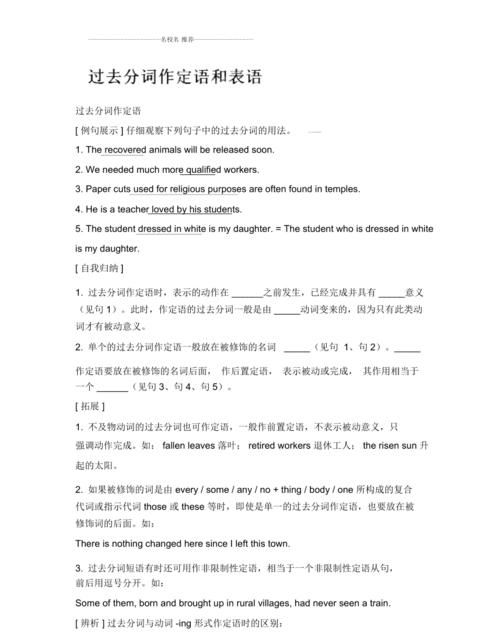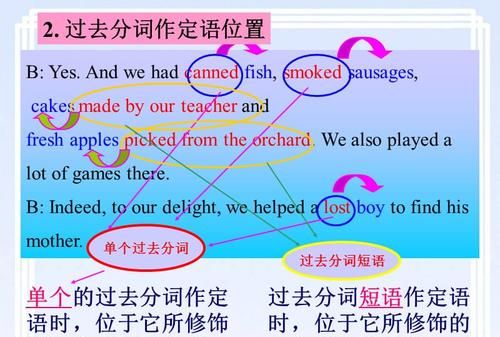本文目录
英语中名词作定语和形容词作定语的区别
英语分词具有形容词的性质,可以看做是形容词,比如 interesting(令人感兴趣的) , interested(有兴趣的)
现在分词做形容词表示令人怎么样的,用来形容事物, 过去分词表示人是怎么样的
what a dispointing result ! 表示结果令人失望,所以用现在分词
如果用disappointed则是形容人失望沮丧的 ,
例句:She was disappointed that he never replied to her letter . 他从来不回她的信,她感到很失望。

英语语法后置定语
语法部分 分词作定语
不及物动词的现在分词作定语表达强调动作正在进行,过去分词强调完成;及物动词的现在分词作定语强调主动,过去分词强调被动。分词的完成式一般不作定语。分词作其他成分时,也是如此。分词作定语,单个的分词作定语一般前置;分词词组,个别分词如given, left等,修饰不定代词等的分词,作定语需后置。
例如:
We can see the rising sun. 我们可以看到东升的旭日
He is a retired worker. 他是位退休的工人
There was a girl sitting there. 有个女孩坐在那里
This is the question given. 这是所给的问题
There is nothing interesting. 没有有趣的东西
分词作定语相当于定语从句,如Most of the people invited to the party were famous scientists. = Most of the people who wereinvited to the party were famous scientists.
典型例题
1) The first textbook ___ for teaching English as a foreign language came out in the 16th century.
A. have written B. to be written C. being written D. written
答案D. 书与写作是被动关系,应用过去分词做定语表被动,相当于定语从句 which was written
2)What's the language ____ in Germany?
A. speaking B. spoken C. be spoken D. to speak
答案B. 主语language与谓语动词之间有被动的含义。spoken,在句中作定语,修饰主语language, spoken 与 language有被动关系。该句可以理解为:What's the language (which is) spoken in German?

过去分词做前置定语表被动的例子
过去分词作前置相当于形容词。
后置相当于定语从句。
1、前置定语
单个的过去分词作定语,通常放在被修饰的名词dao之前,相当于形容词,表示被动和完成意义。
A类:被动意义:
an honored guest 一位受尊敬的客人
The injured workers are now being taken good care of in the hospital.
受伤的工人现正在医院受到良好的照料。
B类:完成意义:
a retired teacher 一位退休的教师
They are cleaning the fallen leaves in the yard.
他们正在打扫院子里的落叶。
2、后置定语
过去分词短语作定语时,通常放在被修饰的名词之后,它的作用相当于一个定语从句。如:
his will be the best novel of its kind ever written (=that has ever been written).
这将是这类小说中写得最好的.
Who were the so-called guests invited (=who had been invited) to your party last night?
昨晚被邀请参加你的晚会的那些所谓的客人是谁呀?

过去分词做定语举例子初中
过去分词做定语举例有:
1、Is this the book recommended by the teacher? 这是老师介绍的书吗?
2、Most of the people invited to the conference were my old friends. 大多数被邀请参加会议的人。
3、 The glass broken by my son has been swept away. 被我儿子打破的玻璃已经扫走了。
4、Hangzhou, known to the nation for its West Lake, has changed greatly. 以西湖闻名全国的杭州已发生很大变化。
5、All the broken windows have been repaired. 所有打破的窗子都已被修好。

规则动词的过去分词的构成规则与规则动词的过去式的构成规则相同。四点变化规则:
(1)一般动词加-ed (然而要注意的是,过去分词并不是过去式)。
work——worked
visit——visited
(2)以e结尾的动词加-d。
live—lived
agree—agreed
ante—anted
但ante的过去分词有anteed的写法。
(3)以“辅音字母 + y ”结尾的动词,将 "y" 变为 "i" ,再加-ed。
study—studied
cry—cried
try—tried
fry—fried
ensky—enskied
freeze-dry—freeze-dried
但ensky的过去分词有enskyed的写法。
以上就是关于分词做定语举例子英语 ,英语中名词作定语和形容词作定语的区别的全部内容,以及分词做定语举例子英语 的相关内容,希望能够帮到您。
